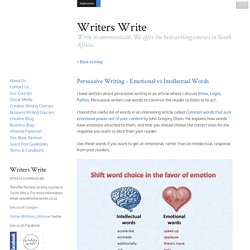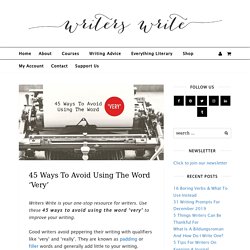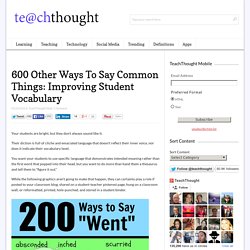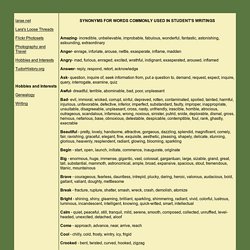

Persuasive Writing - Emotional vs Intellectual Words. I have written about persuasive writing in an article where I discuss Ethos, Logos, Pathos.

Persuasive writers use words to convince the reader to listen or to act. I found this useful list of words in an interesting article called Common words that suck emotional power out of your content by John Gregory Olson. He explains how words have emotions attached to them, and that you should choose the correct ones for the response you want to elicit from your reader. Use these words if you want to get an emotional, rather than an intellectual, response from your readers. Click on the link to read the full article. by Amanda Patterson © Amanda Patterson. 45 ways to avoid using the word 'very'. Writers Write is your one-stop resource for writers.

Use these 45 ways to avoid using the word ‘very’ to improve your writing. Good writers avoid peppering their writing with qualifiers like ‘very’ and ‘really’. They are known as padding or filler words and generally add little to your writing. According to Collins Dictionary: ‘Padding is unnecessary words or information used to make a piece of writing or a speech longer. Synonyms include: waffle, hot air, verbiage, wordiness.’ Adding modifiers, qualifiers, and unnecessary adverbs and adjectives, weakens your writing. This post gives you 45 ways to avoid using the padding word ‘very’. Three Telling Quotes About ‘Very’ “Substitute ‘damn’ every time you’re inclined to write ‘very;’ your editor will delete it and the writing will be just as it should be. If you enjoyed this, you will love: Top Tip: If you want to learn how to write a book, sign up for our online course. by Amanda Patterson.
100 Ways to Say "Bad" Poster – WriteAtHome® Posters. 18 Common Words That You Should Replace in Your Writing. It’s a familiar scene: you’re slumped over your keyboard or notebook, obsessing over your character.

While we tend to agonize over everything from structure to backstory, it’s important to weigh how you write something too. A perfectly constructed world is flat on the page if you use feeble, common words. When you’re finished constructing your perfectly balanced world, do your writing a favor and take another pass to weed out these 18 haggard words. Good High on any list of most used English words is “good.” New Another of the common words in English is “new.” Long Much like “new,” “long” is spent, yet it doesn’t always register as such while you’re writing. Old “Old” is certainly one of those common words that means more to readers if you’re specific about how old a subject is.
Right “Right” is also among the common words that tends to slip through our writer filters. Different Small “Small” is another adjective that is too generic for writing as good as yours. Large. Ways to Say Said Vocabulary Word Bank. Say Synonyms, Say Antonyms. 600 Other Ways To Say Common Things: Improving Student Vocabulary - Your students are bright, but they don’t always sound like it.

Their diction is full of cliche and emaciated language that doesn’t reflect their inner voice, nor does it indicate their vocabulary level. You want your students to use specific language that demonstrates intended meaning rather than the first word that popped into their head, but you want to do more than hand them a thesaurus and tell them to “figure it out.” While the following graphics aren’t going to make that happen, they can certainly play a role if posted to your classroom blog, shared on a student-teacher pinterest page, hung on a classroom wall, or reformatted, printed, hole-punched, and stored in a student binder.
Synonyms for words commonly used in student's writing. Amazing- incredible, unbelievable, improbable, fabulous, wonderful, fantastic, astonishing, astounding, extraordinary Anger- enrage, infuriate, arouse, nettle, exasperate, inflame, madden.
